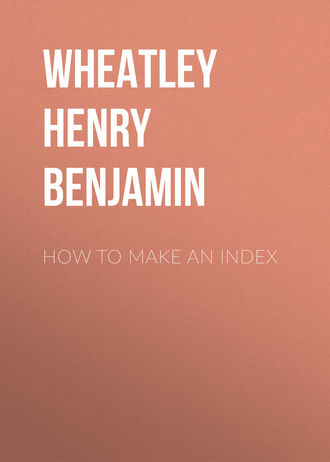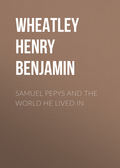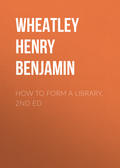
Wheatley Henry Benjamin
How to Make an Index
Moreover, these instances do not really meet the case, for they belong to another class, which has to be dealt with in cataloguing—that is, those who change their names. When a man succeeds to a peerage he changes his name just as a Commoner may change his name in order to succeed to a certain property.
8. Foreign compound names to be arranged under the first name, as Lacaze Duthiers. English compound names under the last, except in such cases as Royston-Pigott, where the first name is a true surname. The first name in a foreign compound is, as a rule, the surname; but the first name in an English compound is usually a mere Christian name.
This rule is open to some special difficulties. It can be followed with safety in respect to foreign names, but special knowledge is required in respect to English names. Of late years a large number of persons have taken a fancy to bring into prominence their last Christian name when it is obtained from a surname. They then hyphen their Christian name with their surname, because they wish to be called by both. The Smiths and the Joneses commenced the practice, but others have followed their lead. The indexer has no means of telling whether in a hyphened name the first name is a real surname or not, and he needs to know much personal and family history before he can decide correctly.
Hyphens are used most recklessly nowadays, and the user has no thought of the trouble he gives to the indexer. If the Christian name is hyphened to the surname, and all the family agree to use the two together as their surname, the indexer must treat the compound name as a true surname. Often a hyphen is used merely to show that the person bearing the names wishes to be known by both, but with no intention of making the Christian name into a surname. Thus a father may not give all his children the same Christian name, but change it for each individual, as one son may be James Somerset-Jones and another George Balfour-Jones. In such a case as this the hyphen is quite out of place, and Jones must still be treated as the only surname. No one has a right to expect his Christian name to be treated as a surname merely by reason of his joining the Christian name to the surname by a hyphen. He must publicly announce his intention of treating his Christian name as a surname, or change it by Act of Parliament. Even when the name is legally changed, there is often room for confusion. The late Mr. Edward Solly, F.R.S., who was very interested in these inquiries, drew my attention to the fact that the family of Hesketh changed their name in 1806 to Bamford by Act of Parliament, and subsequently obtained another Act to change it back to Hesketh. The present form of the family names is Lloyd-Hesketh-Bamford-Hesketh.
With respect to Spanish and Portuguese names it is well to bear in mind that there are several surnames made from Christian names, as, for instance, Fernando is a Christian name and Fernandez is a surname, just as with us Richard is a Christian name and Richards a surname.
9. An adjective is frequently to be preferred to a substantive as a catchword; for instance, when it contains the point of the compound, as Alimentary Canal, English History; also when the compound forms a distinctive name, as Soane Museum.
The object of this rule is often overlooked, and many indexers purposely reject the use of adjectives as headings. One of the most marked instances of an opposite rule may be seen in the index to Hare's Walks in London (1878), where all the alleys, bridges, buildings, churches, courts, houses, streets, etc., are arranged under these headings, and not under the proper name of each. There may be a certain advantage in some of these headings, but few would look for Lisson Grove under Grove, and the climax of absurdity is reached when Chalk Farm is placed under Farm.
10. The entries to be as short as is consistent with intelligibility, but the insertion of names without specification of the cause of reference to be avoided, except in particular cases. The extent of the references, when more than one page, to be marked by indicating the first and last pages.
This rule requires to be carried out with judgment. Few things are more annoying than a long string of references without any indication of the cause of reference, but on the other hand it is objectionable to come across a frivolous entry. The consulter is annoyed to find no additional information in the book to what is already given in the index. It will therefore be found best to set out the various entries in which some fact or opinion is mentioned, and then to gather together the remaining references under the heading of Alluded to.
The most extreme instances of annoying block lists of references under a name are to be found in Ayscough's elaborate index to the Gentleman's Magazine, where all the references under one surname are placed together without even the distinction of the Christian name. The late Mr. Edward Solly made a curious calculation as to the time that would be employed in looking up these references. For instance, under the name Smith there are 2,411 entries en masse, and with no initial letters. If there were these divisions, one would find Zachary Smith in a few minutes, but now one must look to each reference to find what is wanted. With taking down the volumes and hunting through long lists of names, Mr. Solly found that two minutes were occupied in looking up each reference; hence it might take the consulter eight days (working steadily ten hours a day) to find out if there be any note about Zachary Smith in the magazine, a task which no one would care to undertake.
A like instance of bad indexing will be found in Scott's edition of Swift's Works. Here there are 638 references to Robert Harley, Earl of Oxford, without any indication of the reason why his name is entered in the index. This case also affords a good instance of careless indexing in another particular, for these references are separated under different headings instead of being gathered under one, as follows:

The late Mr. B. R. Wheatley read a paper before the Conference of Librarians (1877) on this subject of indexes, without details of the reason or cause of reference, entitled, "An 'Evitandum' in Index-making, principally met with in French and German Periodical Scientific Literature" (Transactions, p. 88). He pointed out that often in German Indexes the entries in the Sach Register would be full and correct, while those in the Namen Register would usually be meagre, and consist merely of the surnames of the authors and the initials of their Christian names. He then referred to many instances of the uselessness of these indexes. He further referred to the forty so-called indexes of subjects added to Allibone's valuable Critical Dictionary of English Literature, which are practically useless. He concluded his paper with these words:
"You are referred to the 'Morals and Manners' index for such varied subjects as Apparitions, Divorce, Marriage, Duelling, Freemasonry, Mormonism, Mythology, Spiritualism and Witchcraft. There are 1,365 names in this index, and how are you to discover which belong to any of the above subjects without wading through the whole? It is, in fact, an entire system of indexing backwards from particulars to generals, instead of from generals to particulars. It is something like writing on a sign-post on the road to Bath, 'To Somersetshire,' and if in one phrase I were to add a characteristic entry to these sub-indexes, or to give one form of reference which should be typical of this style of index, I should say—Needle, see Bottle of Hay. You find the bottle of hay—but where is the needle?"
The form in which the various entries in an index are to be drawn up is worthy of much attention, and particular care should be taken to expunge all redundant words. For example, it would be better to write:
"Smith (John), his character; his execution,"
than
"Smith (John), character of; execution of";
or
"Brown (Robert) saves money,"
than
"Brown (Robert), saving of money by."
A good instance of the frivolous entry is the hackneyed quotation,
"Best (Mr. Justice), his great mind,"
which is supposed to be a reference to a passage in this form: "Mr. Justice Best said that he had a great mind to commit the man for trial." This particular reference is almost too good to be true, and I have not been able to trace it to its source. That has been said to be in the index to one of Chitty's law-books, and it is added that possibly Chitty had a grudge against Sir William Draper Best, one of the Puisne Judges of the King's Bench from 1819 to 1824, and Lord Chief Justice of the Common Pleas from 1824 to 1829, in which latter year he was created Lord Wynford. Another explanation is that it was a joke of Leigh Hunt's, who first published it in the Examiner.
11. Short entries to be repeated under such headings as are likely to be required, in place of a too frequent use of cross references. These references, however, to be made from cognate headings, as Cerebral to Brain, and vice versâ, where the subject matter is different.
Cross references are very useful, but they are not usually popular with those who are unaccustomed to them. They ought to be used where the number of references under a certain heading is large, but it is always better to duplicate the references than to refer too often to insignificant entries.
12. In the case of journals and transactions brief abstracts of the contents of the several articles or papers to be drawn up and arranged in the alphabetical index under the heading of the article.
The advantage of this plan is that a précis can be made of the articles or papers which will be useful to the reader as containing an abstract of the contents, much of which might not be of sufficient importance to be sorted out in the alphabet; in the case where the entries are important they can be duplicated in the alphabet. A good specimen of this plan of indexing may be found in the indexes to the Journal of the Statistical Society.
13. Authorities quoted or referred to in a book, to be indexed under each author's name, the titles of his works being separately set out and the word "quoted" added in italics.
This rule is quite clear, and there is nothing to be added to it. It is evident that all books quoted should be indexed.
14. When the indexed page is large, or contains long lists of names, it is to be divided into four sections, referred to respectively as a, b, c, d; thus if a page contains 64 lines, 1-16 will be a, 17-32 b, 33-48 c, 49-64 d. If in double columns, the page is still to be divided into four—a and b forming the upper and lower halves of the first column, and c and d the upper and lower halves of the second column.
This division of the page will often be found very useful, and save much time to the consulter.
15. When a work is in more than one volume, the number of the volume is to be specified by small Roman numerals. In the case of long sets, such as the "Gentleman's Magazine," a special Arabic numeral for indicating the volume, distinct from the page numeral, may be employed with advantage.
The frequent use of high numbers in Roman capitals is very inconvenient.
16. Entries which refer to complete chapters or distinct papers, to be printed in small capitals or italics.
This is useful as indicating that the italic entry is of more importance than those in Roman type.
17. Headings to be printed in a marked type. A dash, instead of indentation, to be used as a mark of repetition. The dash to be kept for entries exactly similar, and the word to be repeated when the second differs in any way from the first. The proper name to be repeated when that of a different person. In the case of joint authors, the Christian name or initials of the first, whose surname is arranged in the alphabet, to be in parentheses, but the Christian names of the second to be in the natural order, as Smith (John) and Alexander Brown, not Smith (John) and Brown (Alexander).
Dashes should be of a uniform length, and that length should not be too great. It is a mistake to suppose that the dash is to be the length of the line which is not repeated. If it be necessary to make the repetition of a portion of the title as well as the author, this should be indicated by another dash, and not by the elongation of the former one.
The reason for the last direction in this rule is that the Christian name is only brought back in order to make the alphabetical position of the surname clear; and as this is not necessary in respect to the second person, the names should remain in their natural order.
The initials which stand for Christian names often give much trouble, particularly among foreigners. Most Frenchmen use the letter M. to stand for monsieur, giving no Christian name; but sometimes M. stands for Michel or other Christian name commencing with M. The Germans are often very careless in the use of initials, and I have found in one index of a scientific periodical the following specimens of this confusion: (1) H. D. Gerling, (2) H. W. Brandes, (3) D. W. Olbers. Here all three cases look alike, but in the first H. D. represent two titles—Herr Doctor; in the second, H. W. represent two Christian names—Heinrich Wilhelm; and in the third one title and one Christian name—Dr. W. Olbers.
The above rules do not apply to subject indexes, and in certain cases may need modification in accordance with the special character of the work to be indexed. On the whole, it may be said that an alphabetical index is the best; but under special circumstances it may be well to have a classified index. Generally it may be said that there are special objections to classification, and therefore if a classified index is decided upon, it must needs be exceptional, and rules must be made for it by the maker of the index.
In the foregoing rules no mention is made of the difficulties attendant on the use of Oriental names. Under "Rules for a Small Library" in How to Catalogue a Library, I wrote:
"7. Oriental names to be registered in accordance with the system adopted by a recognised authority on the subject."
This, however, is only shifting the responsibility. In an ordinary English index this point is not likely to give much trouble, and the rule may be safely adopted of registration under the first name. But where there are many names to be dealt with, difficulties are sure to arise. In India the last name is usually adopted, and the forenames are frequently contracted into initials, so that it is obligatory to use this name. We must never forget the practical conclusion that a man's real name is that by which he is known. But the indexer's difficulty in a large number of cases is that he does not know what that name is. Sir George Birdwood has kindly drawn up for me the following memorandum on the subject, which is of great value, from the interesting historical account of the growth of surnames in India under British rule which he gives.
On the Indexing of the Names of Eastern People.
Confining myself to the people—Parsees, Hindoos, and Mussulmans (muslimin)—of India, I find it very difficult to state an unexceptionable rule for the indexing of their names; and I index them in the order in which they are signed by the people themselves. The first or forename of a Parsee or a Hindoo, but not of a Mussulman if he be a Pathan, is his own personal or, as we say, "Christian"—that is, baptismal or "water"—name; and their second their father's personal name, and not his family or, as we say, "blood" name, or true surname. The naming of individuals in the successive generations of a Parsee or Hindoo, and certain Mussulmanee families, runs thus: A. G., N. A., U. N., and so on, the grandfather's name disappearing in the third generation.
The Parsees only in comparatively recent times adopted family or true surnames derived from the personal or paternal names, or both, of the first distinguished member of the family, or from his occupation or place of residence, or from some notable friend or patron of his, or from some title conferred on him by the ruler whose subject he was. Thus the Patels of Bombay are descended from Rustom (the son of) Dorabjee, who, for the assistance he gave the English in 1692 against the Seedee of Junjeera, was created, by sanad (i.e. patent), patel (i.e. mayor) of the Coolees of Bombay.
The Parsee Ashburners derive their patronymic from an ancestor in the early part of the late century, the friend and associate of a well-known English gentleman then resident in Western India. The Bhownaggrees take their name from an ancestor, a wealthy jaghirdar, who in 1744 built a tank of solid stone for public use at Bhavnagar in Kattyawar, and also from their later official connection with this well-known "model Native State." The Jamsetjee Jejeebhoys and Comasjee Jehanghiers derive their double-barreled surnames from the first baronet and knight, respectively, of these two eminent Parsee families. Other well-known Parsee surnames are Albless, Bahadurjee, Banajee, Bengalee, Bhandoopwala, Bharda, Cama (or Kama), Dadysett, Damanwala, Gamadia, Gazdar, Ghandi, Kapadia, Karaka, Khabrajee, Kharagat, Kohiyar, Marzban, Modee, Petit (Sir Dinshaw Manockjee Petit, first baronet of this name), Panday, Parak, Sanjana, Sayar, Seth, Sethna, Shroff, Talyarkan, Wadia. Some of their surnames are very eccentric, such as Doctor, Ready-money, Solicitor, etc., and should be abolished. There is actually a Dr. Solicitor.
The interesting point about the Parsee surnames is that when first introduced, through the influence of their close contact with the English, they were not absolutely hereditary, but were changed after a generation or two. Thus the present Bhownaggrees used, at one time, the surname of Compadore, from the office so designated held by one of their ancestors under the Portuguese.
The Hindoos have always had surnames, and jealously guard their authenticity and continuity in the traditions of their families, although they do not, even yet in Western India, universally use them in public. Their personal and paternal names are derived, among the higher castes, from the names of the gods, the thousand and one names of Vishnoo and Seeva, of Ganesha, etc., and from the names of well-known mythological heroes, historical saints, etc., the name selected being one the initial of which indicates the lunar asterism (nakshatra) under which the child (i.e. a son) is born; but their surnames have a tribal, or, as in the case of the Parsees, a local, or official, or some other merely accidental, origin.
If, then, we had only to deal with the Hindoos and Parsees, they might be readily indexed under their surnames. But when we come to the Indian Mussulmans the problem is at once seen to be beset with perplexities which seem to me impossible to unravel. The Indian Mussulmans—indeed all muslimin—are classified as Sayeds, Sheikhs, Mo(n)gols, and Pathans. The Sayeds (literally, "nobles," "lords") are the descendants of the Prophet Mahomet, through his son-in-law Allee; those descended through Fatima being distinguished as Sayed Hussanee and Sayed Hooseinee, and those from his other wives as Sayed Allee. The first name given to a Mussulman of this class is the quasi-surname Sayed or Meer (also, literally, "nobleman," "lord"), followed by the personal name and the paternal name; but these quasi-surnames often fall into disuse after manhood has been reached.
The Sheikhs (literally, "chiefs"),—and all muslimin descended from Mahomet and Aboo Bukeer and Oomur are Sheikhs,—have one or other of the following surnames placed before or after their personal and paternal names: Abd, Allee, Bukhs, Goolam, Khoaja, Sheikh. But as Sayeds are also all Sheikhs, they sometimes, on attaining manhood, assume the surname of Sheikh, dropping that of Sayed, or Meer, given to them at birth.
The Mo(n)gols, whether of the Persian (Eranee) sect of Sheeahs, or the Turkish (Tooranee) sect of Soonnees, have placed before, or after, their personal and paternal names, one or other of the following surnames: Aga ("lord"), Beg ("lord"), Meerza, and Mo(n)gol. But in Persia both Sayeds and Sheikhs assume, instead of their proper patronymics, the surname of Aga, or Beg, or Mo(n)gol; while Mo(n)gols whose mothers are Sayeds are given the pre, or post, surname of Meerza.
The Pathans have the surname Khan ("lord") placed invariably after their personal and paternal names. But Sayeds and Sheikhs often have the word Khan placed after their class, personal, and paternal names—not, however, as a surname, but as a complimentary or substantial title, pure and simple.
Again, all classes of muslimin, and the Hindoos also, and even the Parsees, are in the habit of adding all sorts of complimentary and substantial titles both before and after their names. How, then, is it possible to apply any one rightly reasoned rule to the indexing of such names, or any but the arbitrary rule of thumb:—to index them in the order in which the bearer of them places them in his signature to letters, cheques, and other documents? This gets over all the embarrassing difficulties created by the paraphernalia of a man's official designations, complimentary—or substantial, titles, etc. Take, for example, this transcript of a hypothetical Hindoo official's visiting-card:
"Dewan Sahib" (official and courtesy titles).
"Rajashri" (special social title).
"A." (personal name).
"B." (paternal name).
"Z." (family or true surname).
No Englishman unfamiliar with the etiquettes of Indian personal nomenclature could possibly index such a card as this with intelligent correctness. But this Hindoo gentleman would simply sign himself in a private letter, "A. B. Z." (i.e. A., the son of B., of the clan of Z.), and so he should be indexed.
The personal names of muslimin also have for the most part an astronomical association, being generally selected from those beginning with the initial or finial letter of the name of the planet ruling the day on which the child (i.e. a son) is born.
I presume that what I have here said of the methods of naming the Indian Mussulmans also applies to the muslimin of Persia and Central Asia and Turkey and Arabia; but beyond these countries I have no information as to the methods of naming people in the other Oriental Indies, such as Ceylon, Burmah, China, and Japan.
As to the transliteration of Oriental personal names, I always accept that followed by the person bearing them.
I have put the matter as briefly as possible, and almost too briefly for absolute accuracy of expression; and it will be noted I say nothing of local exceptions to the general rule regulating Hindoo names of persons; and, again, nothing of female names, Hindoo, Mussulmanee, or Parsee.
GEORGE BIRDWOOD.
January 9, 1902.






